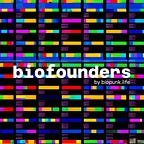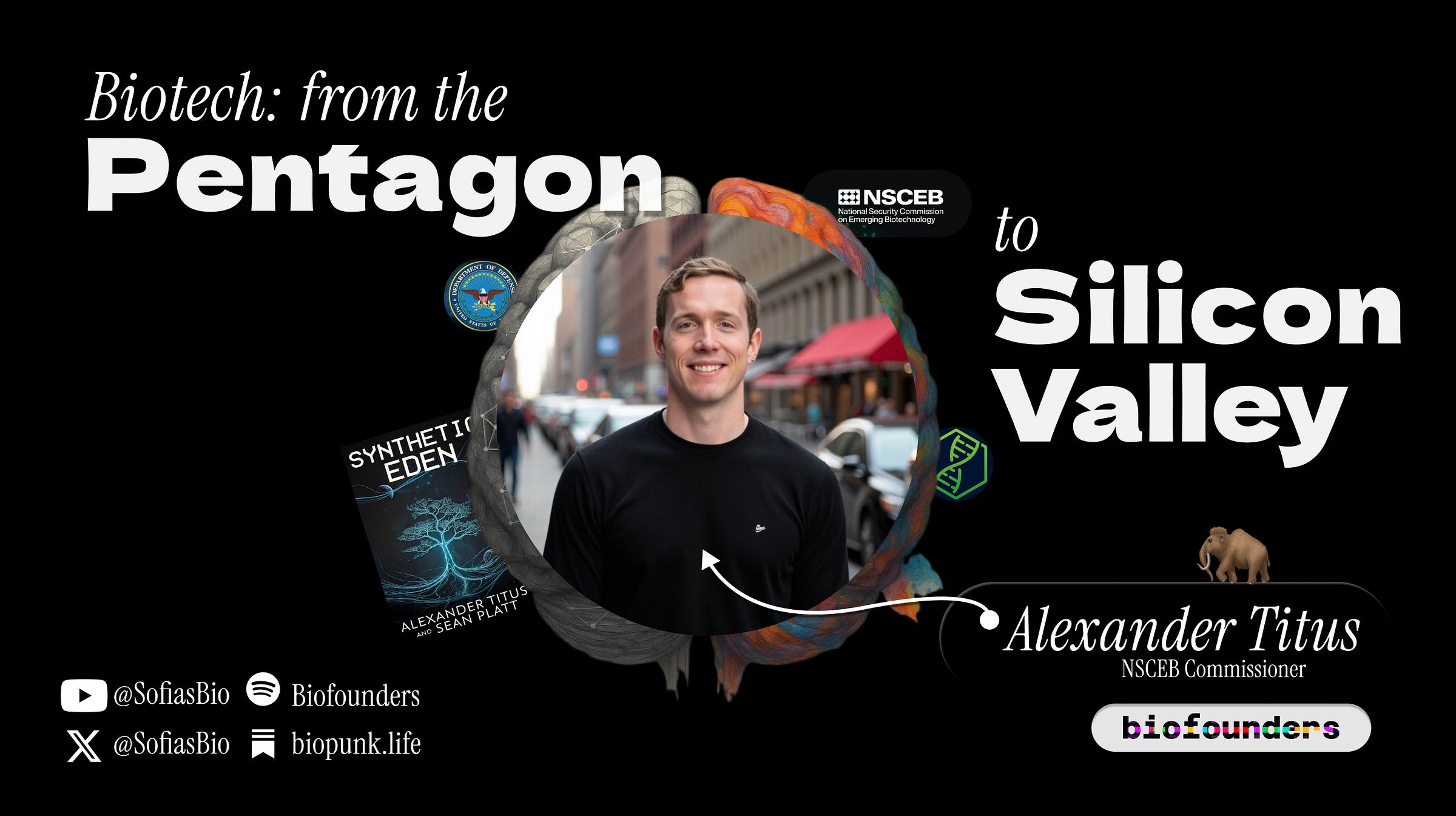As part of his work in the public sector, Alexander Titus is one of the Commissioners at the United States National Security Commission on Emerging Biotechnology. He previously worked at the DoD as the Head of Biotechnology Strategy, and helped launch PPPs BioMADE and armi.
With too many interests to count, Titus was also part of early-stage startups like Colossal Biosciences; he worked at Google’s healthcare and life sciences division, and cofounded Dauntless Ventures and Decycle Bio.
We’ve followed each other since he ran the Bioeconomy.XYZ publication in 2020. Today, he writes about the intersection of science, technology, policy, futures, and fiction through The Connected Ideas Project. His first science fiction novel, Synthetic Eden is now available.
In this Biofounders episode:
0:00-3:53 Introduction
3:55 Public and private sector in biotech innovation
10:11 Questions the Pentagon asking about biotech during the pandemic
13:13 Building credibility as biotechnologists through different storytelling
17:49 Lessons from Bioeconomy.XYZ, The Connected Ideas Project, and Synthetic Eden
21:05 How to think about genetically engineered human embryos
27:11 Increasing our reliance on AI and robotics-powered biotechnology
32:35 US-China biotechnological race
36:20 Metrics to assess the progress of biotech
40:37 Lessons from the last few years of the biotech industry and analogies to the tech industry
46:09 How Titus personally decides what to work on at a given time
Biofounders: Fun conversations with unconventional founders, biohackers, CEOs, and investors you haven’t met yet | Follow along on LinkedIn, Twitter, YouTube, and Instagram | Support the podcast with a 5-star rating on Spotify ⭐⭐⭐⭐⭐
The following is an edited version of our conversation where I include some of my personal takeaways and thoughts around the issues we discussed.
Between the Pentagon and Silicon Valley
Titus has evidently moved everywhere in between the Pentagon and Silicon Valley. My first question was what each sector may systematically misunderstand about the others when it comes to biotechnology.
He highlighted that the most common misconceptions are not about the technology, but about the process through which that community operates.
Innovators like to say that government is super slow compared to them, but the difference in governments is that they manage orders of magnitude more millions of dollars. Even though they don’t swing quickly, governments make big moves when they do.
Similarly, assuming that companies can “just move fast and break things” if they’re given enough capital is wrong if there’s not a good structure or much more basic technological advancements are required first.
He shared the American Association for the Advancement of Science (AAAS) as an example of how scientists can provide scientific perspective to policy-makers, as well as BioMADE and ARMI, as examples of biotech public-private partnerships in the US.
He also pointed out, however, that we lack understanding in the other direction: a way for policy-makers to understand how startups and companies work from the inside — I suggest they read Biopunk as a start…
After that, I was curious to see a bit inside the Pentagon. Titus was there during a particularly interesting time, between 2019 and 2020 when the COVID pandemic was just getting started. I asked him what key questions were being asked about biotech there and then.
“My job was to bring the green goo to the zoom and boom people” he shared. Biology became real from a defense standpoint when all of a sudden the military couldn’t operate because they too had to quarantine. It was harder to understand the relevance of biotechnology before then.
Telling different stories
Going back to the subject of communication between scientists and people with other roles, I wondered if showing the products instead of just talking about them may strengthen bioscientists’ credibility in front of policymakers… though I now acknowledge this may also look like a chicken-egg problem.
Before the classic “Show don’t tell”, Titus suggested that there’s another way to tell. We both agree that most scientists are trained to fact-tell more than we are trained to story-tell, and this bores the hell out of everyone (I think that sometimes even scientists ourselves).
To add on to that, we barely stop to think of how much of a faith-based biology is. While this may sound very spicy to most scientists, one just needs to put on the shoes of anyone who doesn’t perform biological experiments on their day-to-day to realize that all the liquids we move around look the same.
It’s easy to forget that before we picked up a microscope, we couldn’t see individual cells. DNA, viruses, bacteria, or even our individual cells, and how they behave feel more real to us because we see them through our equipment on our everyday.
Contrast that with electrical engineering, which has now manifested into all sorts of electronic devices that we use all the time, or chemical engineering which has also made possible a great amount of objects around us, from the fuel in our cars to our nylon clothes.
Now, of course, I’m not saying that people don’t interact with biology at all. After all, we are biology ourselves, and we eat the product of it every day. But bioengineering itself is what is just beginning to have that first-hand connection with final consumers that other kinds of products have.
After his time at the Pentagon, Titus built Bioeconomy.XYZ as a platform for scientists to tell their stories. Not only the what but also the why. In this sense, he thinks science fiction helps you build characters who live the experience that you’re trying to convey, and to forecast how these technologies may evolve.
Thinking about designer babies
A lot of the hardest (and personally most exciting) topics to discuss and communicate in biotechnology these days inevitably carry with them ethical questions.
However, I often argue that when it comes to issues like gene-edited human embryos, “should we?” is the wrong question. I wanted to ask Titus not what he thinks of this topic, but how we think of it, and what better ways there are of discussing it.
He agreed that it’s not an “if” question, but a “when” question. His book, Synthetic Eden, is made to stop people from hiding in corners in these debates and decide between supporting genetic engineering or human extinction.
That triggered a thought I’ve been having lately around the dependency we may eventually develop on automated and AI-powered IVF and potentially even “human production” quite à la Brave New World — What will happen when not using these technologies to create healthy humans is not an alternative? When human and other species’ reproduction becomes a matter of machines?
Titus thinks these worries are not too dissimilar from those people had in the 19th century regarding electricity — I may agree. A technology becoming indispensable may actually be a sign of its excellence over the “alternatives”.
After all, the whole urban world already depends on electricity, automobiles, the internet, fossil fuels, and increasingly on AI. And to the point of enhancement, we already are enhanced by these technologies. The industrialization of biology — growing things inside bioreactors — may one day reach that point as well.
Biotechnology is changing what it means to be human, or any other species for that matter. When Titus was at Colossal — yes, the company that “de-extinguished the dire wolf and the woolly mice” — he used to ask himself “where does an elephant end and a mammoth start?”.
We may also ask how far we can engineer ourselves before we stop being human. Personally, I align with Julian Huxley’s vision that the human race is to be transcended (transhumanism!)… I wonder if, from a philosophical point of view, the maximal mission of genetic engineering is actually to engineer humankind into something else that is definitely no longer human: to “extinguish” ourselves?
Assessing progress in biotechnology
“Why did it take so long for the US government to wake up to China?” I dared to ask. In retrospect, it’s obvious that these affairs only became public this year. Still, Titus reasons that where the US used to expect to lead science until recently, they don’t take that for granted anymore.
I personally ignore any economic theories of innovation, but it was interesting to remember how, unlike the US, countries like Singapore and China have multi-decade-long plans for specific areas of innovation (like BCIs or food security). From a Thielean standpoint, they’re definite optimists.
As the US goes through a whole lot of changes in their public science institutions, it seems a good time to ask what metrics could reliably help us assess the progress in biotechnology, in a country like that.
While the number of papers and patents is still relevant, that science needs to be operationalized it into companies and products, or else we won’t actually benefit from it. Titus, therefore, would pay closer attention to companies that last.
“Back in 2019, biotech companies would come to me saying ‘I can make anything you want, what do you want?’. But people want to buy a bottle of water, not gallons of chemicals. Everybody had brought beautiful platforms to serve, but we were all starving because nobody had brought any food. The first era of biotech was selling microchips for computers that didn’t exist yet”.
With this in mind, and after learning a bit about his own journey in the biotech industry throughout these years, I was curious to know how Titus personally decided which biotech projects are worth pursuing at any given moment.
“I am less focused on the what than the who. I love doing hard things with great people”. Though he doesn’t like to point to “the next big thing”, he thinks that shortening cycle times to read, write and engineer biology will be very important.












